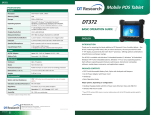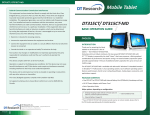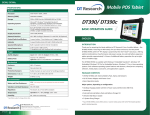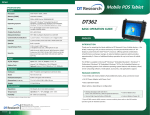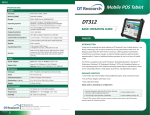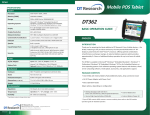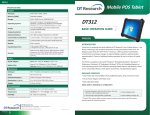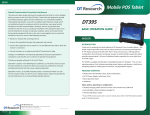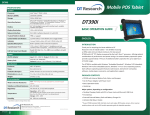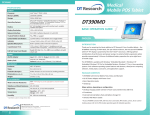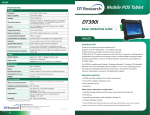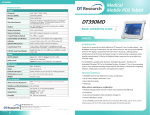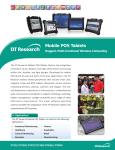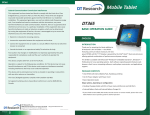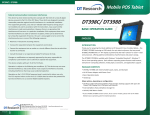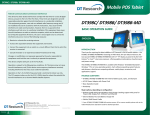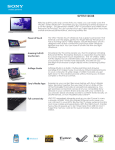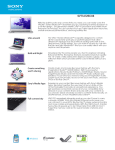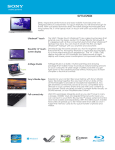Download DT Research DT372
Transcript
DT372 Mobile POS Tablet SPECIFICATIONS System Processor Intel® Atom™ Z530, 1.6GHz Memory (RAM) 2GB Storage 2GB to 32GB Flash Operating Systems Microsoft® Windows® Embedded Standard 7, Windows® 7 Professional, Windows® XP Embedded, Windows® XP Pro for Embedded Systems, or Linux Display 7” LED-backlight screen with resistive touch; sunlight-readable option Display Resolution 1024 x 600 (WSVGA) Network Interface Wi-Fi 802.11a/b/g/n, Bluetooth 2.1 with EDR Control Switch and Buttons 1 power button, 5 front buttons and 1 trigger button Indicator 1 power/ battery status LED and 1 WLAN active LED Speaker/Microphone Built-in speaker; built-in internal microphone Input/Output Ports 1 DC-in Jack; 1 USB 2.0 port; 1 Headphone-out Jack combined with microphone BASIC OPERATION GUIDE Power AC/DC Adapter Input: 100 – 240V AC; Output: 19V DC, 2.36A Battery Pack Removable 7.4V, 3760mAh DT372 ENGLISH INTRODUCTION Thank you for acquiring the latest addition to DT Research’s line of mobile tablets— the DT372. Featuring an IP64-rated, slim yet robust enclosure, the two-pound DT372 with 7” TFT display is powered by the Intel® Atom™ processor, offering optimal combinations of performance and power savings. The DT372 is available with Windows® Embedded Standard 7, Windows® XP Embedded, Windows® XP Pro for Embedded Systems, Windows® 7 Pro or Linux operating systems. Each software operating system features web browser, client/server computing software, media player, accessories, and applications support. Mechanical Enclosure ABS + PC plastics Stylus Non-electronic tip Protective Bumpers Rubber bumpers on each corner for handling protection Dimensions (H x W x D) 7.4 x 9.3 x 1.6 in/ 190 x 237 x 41 mm Weight 2.43 lbs/ 1.1 kg PACKAGE CONTENTS • DT372 with Removable Battery Pack, Stylus with landyard and Bumpers • AC-DC Power Adapter with Power Cord • Handstrap Environmental Water and Dust Resistance IP65 * IP65 rating may not be applicable for units with module options • Basic Operation Guide Major options, depending on configuration: Vibration and Shock Resistance MIL-STD-810G Regulatory FCC Class B, CE, C-Tick, RoHS compliant • Desktop Charging Cradle with DC-in Power Jack, Ethernet, VGA, and USB Port Temperature Operation: 0°C - 40°C; Storage: -20°C - 60°C • Vehicle/ Wall mount cradle Humidity 0% - 90% non-condensing * If your DT372 contains MSR, camera or scanner module, please refer to the POS module operation guide for detailed operation. * Specifications subject to change without notice. DT Research, Inc. 2000 Concourse Drive, San Jose, CA 95131 http://www.dtresearch.com Copyright © 2011, DT Research, Inc. All Rights Reserved. DT Research is a registered trademark of DT Research, Inc. 8 ENGLISHsignage dtri com BOG030712DT372ENG DT372 The DT372 (with Windows XP Operating System) Front View Power/Battery LED Status: Rear View Microphone Wireless LED Battery/Power LED • Blue indicates the battery is 25% to 100% charged 6 • Blinking blue indicates the battery is charging • Orange indicates that the battery is between 11% to 25% • Blinking Orange indicates that the battery is below 10% Precautions • Always exercise care when operating and handling the DT372. • Do NOT apply excessive pressure to the display screen. • We recommend using the Stylus provided to keep the screen clean. 1 2 3 4 5 Calibration Battery and Power Meter Wireless Network Settings Button Management • Avoid prolonged exposure of the display panel to any strong heat source. Wherever possible, the DT372 should face away from direct light to reduce glare. • If the AC-DC power adapter is used to recharge or power the device, do NOT use any AC-DC adapter other than the one provided with the device or acquired from the manufacturer or its partners. Left Input/ Output Ports A DC Power Input B USB Port C Headphone Jack Right 7 A B C • In the unlikely event that smoke, abnormal noise, or strange odor is present, immediately power off the DT372 and disconnect all power sources. Report the problem to your device provider immediately. • Never attempt to disassemble the DT372, as this will void the warranty. THE DT372 Basic Features Button Functions (with Windows XP Operating System) BUTTON ENGLISH ACTION 1 Programmable 2 Programmable, launch soft (on-screen) keyboard (default) 3 Launch SAS (Secure Attention Sequence) Generate Ctrl+Alt+Del keys to invoke the security windows defined under Windows XP 4 Programmable, Change display orientation (portrait/ landscape) (default) 5 Programmable, system utility menu (default) 6 Power on, Push/release typically enters Standby mode, or Push/release exits Standby mode or restarts device (software dependent) Push and hold (over 4 seconds) invokes hardware shutdown 7 Programmable, As scanner trigger when equipped with the scanner module 2 The DT372 wireless tablet integrates a bright and responsive touch display, 1 USB port, and embedded networking elements such as wireless LAN, Bluetooth or optional 3G. The primary device is complemented by a suite of accessories, including battery expansion, docking cradles, and carrying cases, for a comprehensive user experience. A DT372 typically integrates an 802.11a/b/g/n wireless LAN (WLAN) adapter that may connect to other wireless devices or access points. If your DT372 does not come with such a network adapter, please consult your device provider to establish the desired network connectivity. 3 ENGLISH DT372 OPERATION Powering ON and OFF To activate the DT372, use the stylus to push and quickly release the Power Button. The display will come on in a few seconds. To put the DT372 in Standby mode, push and quickly release the Power Button. To turn the DT372 off for extended storage, power off the device safely using any software function that “shuts down computer” provided in the software operating system. NOTE: The battery packs shipped with your device may be low in power—please use the AC-DC adapter with the DT372 when setting up the device for the first time to fully charge the internal battery pack. NOTE: When the battery pack(s) is (are) charging, the blue-colored Battery LED should blink slowly. If plugging in the AC-DC adapter does not trigger this blinking activity and the LED stays dark, the battery pack(s) may have been drained substantially. Try unplugging/ replugging the AC-DC adapter to the DT372 a few times to activate the charging process. Configuring the DT372 The device may be configured using the utilities and methods dictated by the software operating system. The DT372 should be configurable for various properties such as user profiles, network features, and several system elements. Calibration The touch display for the DT372 is calibrated before shipping. In the event that the calibration has been modified or is unsatisfactory, the respective calibration routines (e.g., PenMount (PM) for Windows XP) to calibrate the touch interface may be used. Such applications are typically executed through touch input via Stylus or through mouse click via a USB mouse. Wireless Networking Wireless LAN The DT372 is often delivered with an embedded (user-inaccessible) 802.11a/b/g/n WLAN adapter equipped with a hidden custom antenna. NOTE: To conserve power, use (push and quick release) the Power Button to put the device in “Standby” mode while not in use. Pushing briefly on the same button will wake up the system within seconds. • Through the support of typical WLAN adapters, the DT372 should be able to detect all 802.11 access points in the vicinity for you to select the access point of your choice for connection. NOTE: Avoid using the Power Button (“hold 4+ seconds” feature) to turn off the device—this form of hardware shutdown is intended to be a means of recovery from device lockups, and not as normal operation. • The SSID and WEP/WPA/WPA2 (if enabled) parameters on the DT372 and the access points have to match. The SSID is case-sensitive and it is recommended that you enable WEP/WPA/WPA2 encryption (or advanced alternatives) for secure access. Start Up If the power up (from Standby or otherwise) is successful, the appropriate interface will be displayed after a launch sequence of several seconds. The wireless LAN connection may take 10-15 seconds to be established. ENGLISH 4 • When WEP/WPA/WPA2 is enabled, you may need to consult your network administrator or your networking equipment literature to properly configure associated settings such as Authentication mode, etc. • Refer to the access point operating manuals for setting up the 802.11 access points. 5 ENGLISH DT372 Bluetooth Charging Cradle The DT372 features a built-in Bluetooth adapter that operates on the Microsoft Windows Bluetooth protocol. The Bluetooth configuration application is invoked from the System Tray or from the Control Panel for Windows XP. Follow the instructions and options provided within the application to configure and invoke Bluetooth connectivity with the corresponding peripherals. The DT372 is complemented by an optional Desktop Cradle or Vehicle/ Wall Mount Cradle for support, pass-through charging, and connection to a range of USB peripherals, including keyboard and mouse. The Cradle offers the following interfaces: a DC-in port for the AC-DC adapter, an Ethernet port, VGA and USB ports. Always seat the DT372 securely onto the cradle. The cradle must be powered by the AC-DC adapter for the Ethernet, VGA and USB ports to function. The battery packs on the DT372 may be recharged by connecting the AC-DC adapter directly to the DC-in port on the DT372 or through the DC-in port on the Cradle while the DT372 is docked to the Cradle. NOTE: Bluetooth devices or accessories that are not compatible with the Microsoft Windows Bluetooth protocol may not work with the DT372. Button Management Where supported by software, many of the hard buttons on the DT372 are programmable to perform a function of the user’s choice. The exception is the Power Button and the SAS Button. To activate the button re-assignment application, invoke the Button Manager application, e.g., in Windows XP Embedded . Brightness Control Where supported by device firmware and software, a hard button may be engaged to manipulate the display brightness. Press the System Menu button (Button 5) on the front of the DT372. The System screen will display a Brightness control section with up and down arrows that can be activated with the stylus. Battery and Power Management The DT372 is equipped with an removable 3760mAh Li-Ion battery pack that is capable of supporting approximately 3 - 4 hours of continuous operation. The period between battery recharges can be significantly lengthened by putting the device into Standby mode through the Power Button (see Buttons Function Table) whenever the device is not in use. Depending on the operating software, the DT372 may also be configured to enter various power-saving modes via the Power Button or through timed entry. ENGLISH 6 USING THE DT372 Memory & Storage configuration The DT372 is available with 2GB memory configuration. Storage options currently range from 2GB to 32GB flash memory. Peripherals Support Through its USB ports, the DT372 supports a wide range of USB-based peripherals. These peripherals are applicable for software installation, applications storage, data storage, and system software recovery and updates. The DT372 is also compatible with custom mountable cradle options. These securable and mountable cradles provide an interface to VESA mounts and arms, and to ports that may include USB, Ethernet and pass-through power. 7 ENGLISH




